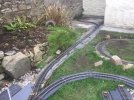Portsladepete
Registered
Some of my layout is wired with a fairly hefty gauge wire which leads into my home made switch box, (waterproof), I have found that the wire that has been outside for 2-3 months does not take solder well at all, this is despite flux and a 100 watt soldering gun.
To discount the outside temperature I removed a section, stripped where the copper was nice and bright, but the result is the same. Using the some of the wire that has been indoors, no problem even with my 30 watt iron.
The wire is multi strand heavy duty speaker wire, do you think this is the problem? Having worked outdoors on vehicles for over 30 years, never came across this before.
To discount the outside temperature I removed a section, stripped where the copper was nice and bright, but the result is the same. Using the some of the wire that has been indoors, no problem even with my 30 watt iron.
The wire is multi strand heavy duty speaker wire, do you think this is the problem? Having worked outdoors on vehicles for over 30 years, never came across this before.

